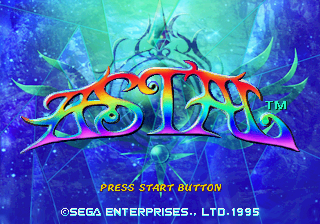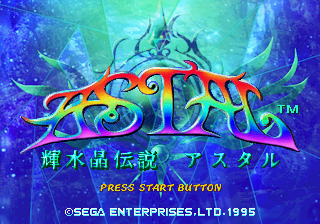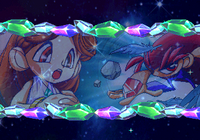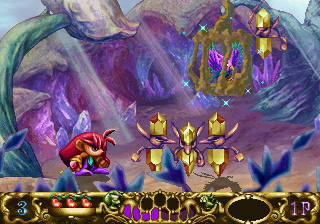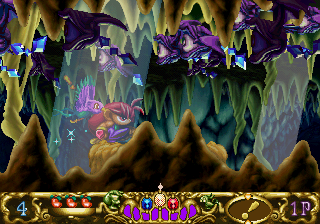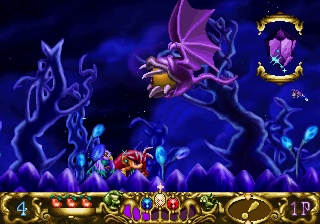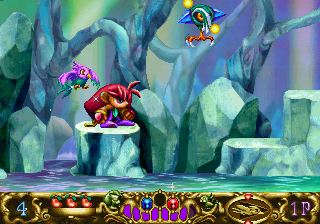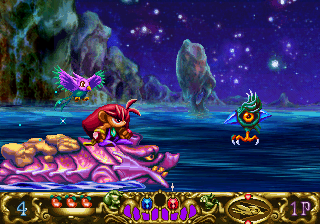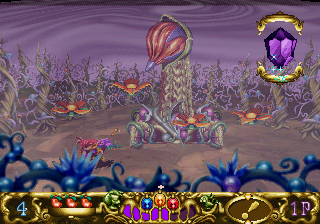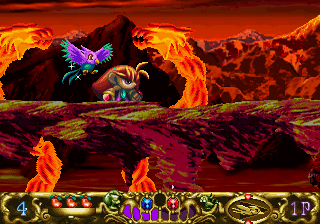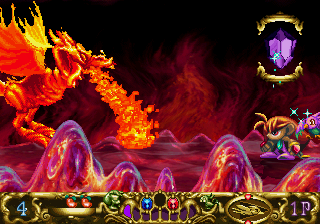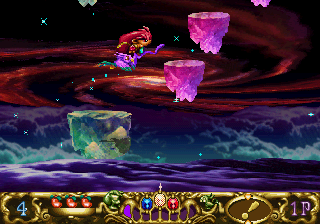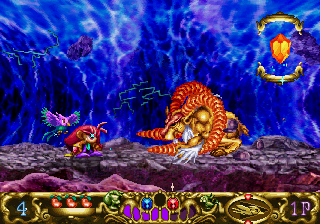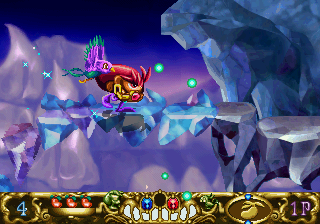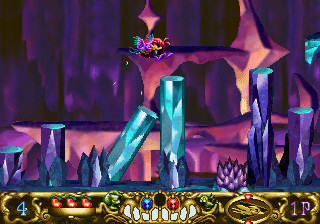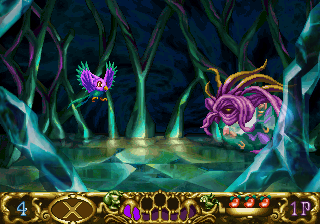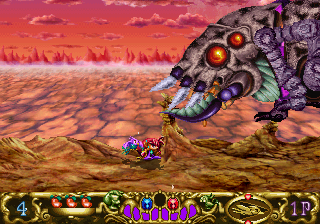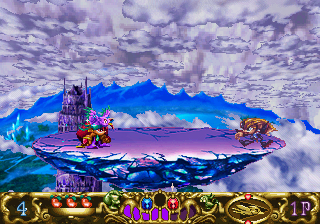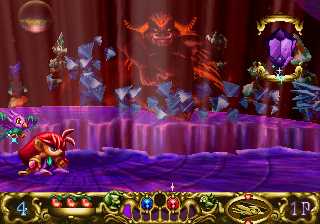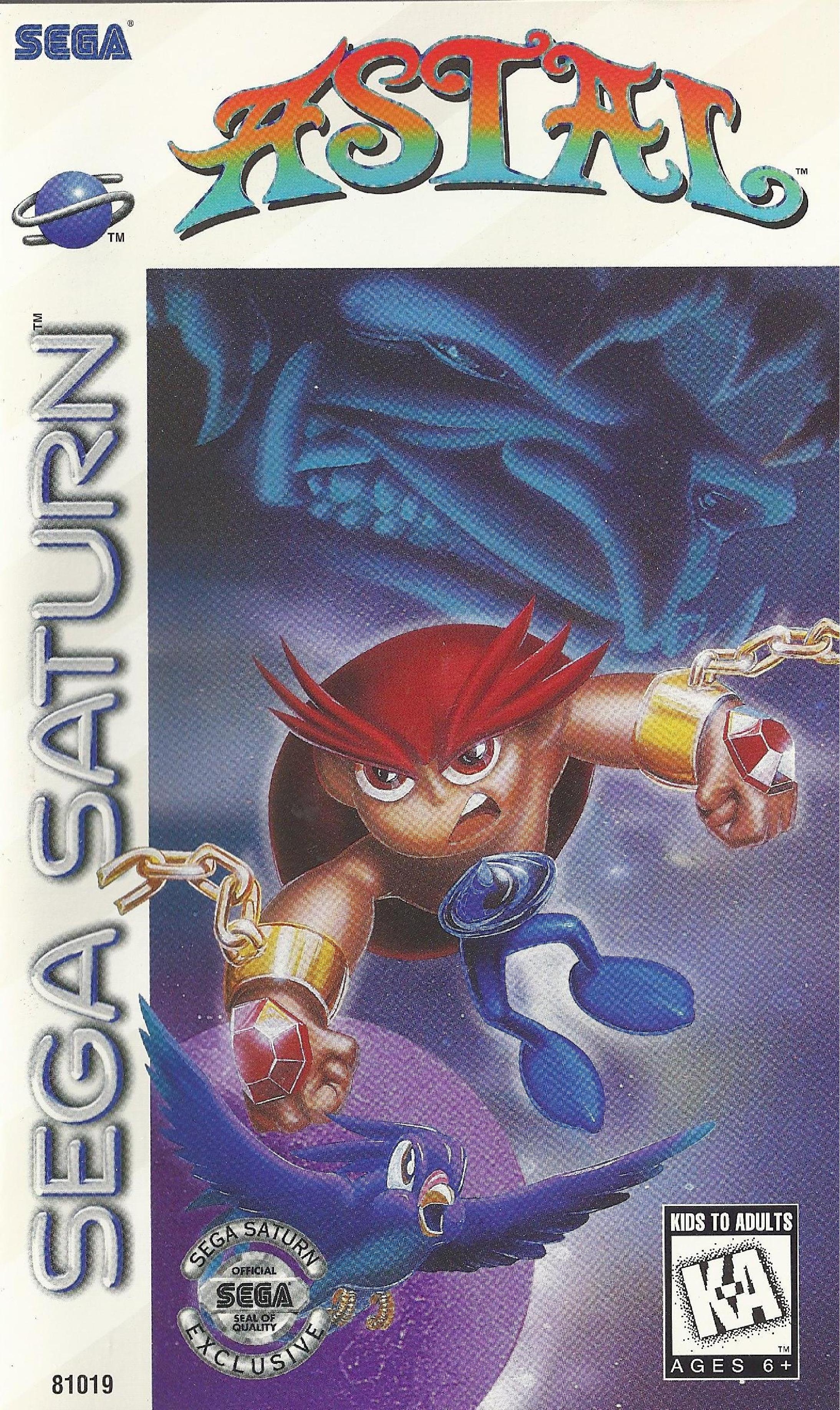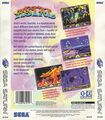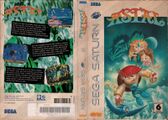Difference between revisions of "Astal"
From Sega Retro
| Line 19: | Line 19: | ||
| sat_code_us=81019 | | sat_code_us=81019 | ||
| sat_rating_us=ka | | sat_rating_us=ka | ||
| − | | sat_rrp_us=59.99{{magref|gamepro|76|62}} | + | | sat_rrp_us=59.99{{magref|gamepro|76|62}}<!--49.99{{magref|vga|0104|32}}--> |
| sat_date_br=199x | | sat_date_br=199x | ||
| sat_code_br= | | sat_code_br= | ||
Revision as of 15:46, 5 July 2023
| ||||||||||||||||||||
| Astal | ||||||||||||||||||||
|---|---|---|---|---|---|---|---|---|---|---|---|---|---|---|---|---|---|---|---|---|
| System(s): Sega Saturn | ||||||||||||||||||||
| Publisher: Sega | ||||||||||||||||||||
| Developer: Sega CS, Tokyo Movie Shinsha (animation) | ||||||||||||||||||||
| Sound driver: SCSP/CD-DA (1 track) | ||||||||||||||||||||
| Genre: Action[1][2] | ||||||||||||||||||||
| Number of players: 1-2 | ||||||||||||||||||||
|
Astal, known in Japan as Kisuishou Densetsu Astal (輝水晶伝説アスタル), is a Sega Saturn action platform game developed by Sega CS and published by Sega. First released in Japan in April 1995, it was later brought to the United States the following August. Notable for its high production values, hand-drawn visuals, and well-received soundtrack, Astal has since gained a reputation as a cult classic.
Contents
Story
Somewhere in the universe, the Goddess Antowas created a world from a single jewel. On this world, Quartalia, she created the sky, earth, and air. To inhabit this world, she created two humans: from a green jewel, a girl, Leda, who has the power to make things live on Quartalia; and from a red Jewel, a boy, Astal, whose purpose was to protect Leda. Content with her creation, Antowas slept.
While she slept, the evil Jerado tried to take over Quartalia. To ensure victory, Jerado created a warrior: Geist. Geist kidnapped Leda, and held her at the bottom of the ocean. In an effort to get her back, Astal tore Quartalia apart, awakening Antowas. As punishment, Antowas banished Astal to Quartalia's moon. Leda took pity on Astal, and gave him her jewel. Once Astal and Jerado were dealt with, Antowas went back to sleep.
However, Geist was still free, and Quartalia was not restored from the changes Jerado wrought. From his prison on the moon, Astal witnessed Geist kidnap Leda again. Consumed with the need to protect her, he freed himself and returned to Quartalia. Now Astal journeys in search of Leda through a Quartalia transformed by Jerado's dark design.
| “ |
One day, from my prison on the moon, I saw him capture Leda again! This was too much! I destroyed my prison, broke my chains and headed back to Quartalia. Nothing in the world means more to me than Leda—nothing! I will find her. I will find the one who took her, and I will deal with him! It's only a matter of time. Quartalia has changed. The demon Jerado has transformed it somehow, and none of the creatures who now live here are friendly. Except for this bird I rescued, who for some reason, just won't leave me alone.... |
„ |
— US manual [5] | ||
Gameplay
Astal is a 2D platform game where the player controls Astal, who is followed by a bird companion. Astal can walk with ![]() and
and ![]() and run with
and run with ![]()
![]() and
and ![]()
![]() . He can crouch with
. He can crouch with ![]() and jump with
and jump with ![]() . He can jump farther while running. He can jump on enemies to stun them and to use as platforms for crossing gaps. He can grab enemies and objects with
. He can jump farther while running. He can jump on enemies to stun them and to use as platforms for crossing gaps. He can grab enemies and objects with ![]() when adjacent to them and throw them by pressing
when adjacent to them and throw them by pressing ![]() again. He can also strike enemies by pressing
again. He can also strike enemies by pressing ![]() while in the air or while running. He can strike the ground with
while in the air or while running. He can strike the ground with ![]() +
+![]() , which can stun enemies or reveal hidden items. He can perform a breath attack by pressing
, which can stun enemies or reveal hidden items. He can perform a breath attack by pressing ![]() to take a deep breath and then pressing
to take a deep breath and then pressing ![]() , which can be used to blow enemies and obstacles away from Astal or to counter enemies with harmful defenses such as flames or spikes.
, which can be used to blow enemies and obstacles away from Astal or to counter enemies with harmful defenses such as flames or spikes.
His bird companion can perform a context-sensitive default action with ![]() . This action is shown by an icon in the bottom-right corner of the display. The action is usually attacking enemies or bringing Astal an item, but there are sometimes stage-specific special actions that the bird can perform. The player can cycle through the icons with
. This action is shown by an icon in the bottom-right corner of the display. The action is usually attacking enemies or bringing Astal an item, but there are sometimes stage-specific special actions that the bird can perform. The player can cycle through the icons with ![]() and
and ![]() to change the behavior of
to change the behavior of ![]() or directly tell the bird to fetch an item with
or directly tell the bird to fetch an item with ![]() , perform a special action with
, perform a special action with ![]() , or attack with
, or attack with ![]() . However, not all actions are always possible; for instance, there is not always an item nearby for the bird to retrieve. There are three colored crystals in the center of the game interface that signal which actions are currently possible. Bird moves expend a resource called Karma, which is indicated by a gauge below the action crystals. Karma is collected by defeating enemies carrying Karma Balls. If the player has no Karma, the bird rests on Astal's shoulder.
. However, not all actions are always possible; for instance, there is not always an item nearby for the bird to retrieve. There are three colored crystals in the center of the game interface that signal which actions are currently possible. Bird moves expend a resource called Karma, which is indicated by a gauge below the action crystals. Karma is collected by defeating enemies carrying Karma Balls. If the player has no Karma, the bird rests on Astal's shoulder.
Astal has a health meter with five fruits in the Japanese release and three fruits in the North American release. He loses one fruit each time he is injured by an enemy or by the environment. If he loses all of his fruits, he loses a life. His health can be replenished by finding fruits in the levels. If he loses all of his lives, the game ends, but it can be continued. The game has unlimited continues in the Japanese release but only one in the North American release.
The game supports two-player cooperative play. At any point during gameplay, another player can start controlling the bird with a second controller. The bird reverts to computer control if the player goes idle. When being controlled by a human, the bird has a health bar and can no longer be controlled by Astal. The bird can move in any direction with the D-Pad and dash with ![]()
![]() or
or ![]()
![]() . The bird can strike enemies with
. The bird can strike enemies with ![]() , hold and release
, hold and release ![]() for a charge attack, or hold and release
for a charge attack, or hold and release ![]() for a dive attack (which can be steered with the D-Pad). These attacks do not cost Karma. If injured, the bird can rest on Astal's shoulder with
for a dive attack (which can be steered with the D-Pad). These attacks do not cost Karma. If injured, the bird can rest on Astal's shoulder with ![]() ; Astal gives the bird one of the fruits from his health meter. Both players can perform a combination attack if Astal does his breath attack with
; Astal gives the bird one of the fruits from his health meter. Both players can perform a combination attack if Astal does his breath attack with ![]() and
and ![]() while the bird does a dive attack with the D-Pad in the direction of Astal and
while the bird does a dive attack with the D-Pad in the direction of Astal and ![]() . This causes the bird to do a ricochet attack against all enemies on screen. This attack costs Karma.
. This causes the bird to do a ricochet attack against all enemies on screen. This attack costs Karma.
The story is progressed by cutscene interludes between the stages, which have scrolling artwork and voice acting, or sometimes by in-game events. There is an introduction cutscene that explains the plot as well as an animated opening cinematic that contains hints on how to defeat the bosses.
Bird Icons
In single-player games, instead of the bird's health gauge, the game shows an icon indicating which action the bird will perform if the player presses ![]() .
.
Items
| Red Fruit | |
|---|---|
| Replenishes one fruit on Astal's health gauge. | |
| Green Fruit | |
| Fully replenishes Astal's health gauge. | |
| 1-Up | |
| Gives the player an extra life in addition to fully replenishing Astal's health and Karma gauges. | |
| Power Star | |
| Fills Astal's Karma gauge. |
Stages
| The Journey Begins | |
|---|---|
| Into the Darkness | |
| The Evil Eye | |
| The Deep Forest | |
| The River of Dreams | |
| The Forest Fiend | |
| Volcanic Valley | |
| Guardian of Fire | |
| Sea of Clouds | |
| The Behemoth | |
| Glacial Rift | |
| The Crystal Palace | |
| Frostbite! | |
| The Plains of Destiny | |
| Destiny Unfolds | |
| The Fight for the Future | |
History
It was originally released in April 1995 in Japan before subsequently seeing a release in North America and Brazil. Curiously the game was never released in Europe, despite initial plans.
Astal was not a launch title in western regions, though was brought to the Saturn in its "software drought" period, created when Sega of America unexpectedly brought the console's launch several months forward. Though reviews of the game were not stellar, it became a common and relatively well-known Saturn title in the regions it was sold in due to a lack of alternative software. Astal has yet to be bought to any other platforms or see any sequels since release.
Versions
Localised names
| Language | Localised Name | English Translation |
|---|---|---|
| English (US) | Astal | Astal |
| Japanese | 輝水晶伝説アスタル | Kisuishou Densetsu Astal |
Comparisons
- Main article: Astal/Comparisons.
Development
- Main article: Astal/Development.
Production credits
- メインプログラム: 向井田 和幸
- プレイヤープログラム: 向井田 和幸, 高橋 敦俊
- システムプログラム: 熊崎 由幸 (日立TS)
- エネミープログラム: 高橋 敦俊, 二川目 真, 坂本 博章, 熊崎 由幸 (日立TS), 堀田 泰丸
- ツール制作: 安藤 隆
- 特殊効果制作: 安藤 隆, 堀田 泰丸
- プログラム進行: 高橋 敦俊
- 美術背景: 岡田 美佳, 浜田 尚子, 川口 博之, 三瓶 昌広, 和田 さおり
- キャラクター制作: 林 求, 川口 博之, 浜田 尚子, 浅井 幸信, 上川 祐司
- CG 3Dオペレータ: 杵村 史朗
- タイトルデザイン: 川口 博之
- 音楽/効果音: 前田 龍之, 幸崎 達哉
- レコーディングスタッフ: 成田 尊, 町田 直幸, 川平 真二, 柴田 文孝
- Sega Sound Library by: InVision Interactive Inc.
- オープニング編集/制作: 川口 博之, 神子 敏康, 井上 善央
- 監督: 増田 敏彦 (東京ムービー新社)
- 美術監督: 水谷 利春 (STUDIO風雅)
- 彩色: 酒井 智子 (東京ムービー新社)
- プロデュース: 竹内 孝次 (東京ムービー新社)
- オープニング/エンディング主題歌: 「Let me try again!」, 「輝く世界を」
- エンディング/イベントアニメ制作: 三瓶 昌広, 和田 さおり, 前田 龍之, 浜田 尚子, 浅井 幸信, 林 求, 岡田 美佳, 川口 博之, 安藤 隆
- スタッフロール背景: 岡田 美佳, 川口 博之, 浅井 幸信, 神子 敏康, 大沼 大, 安藤 隆
- マーケティングプロモーション: 小川 智章, 花谷 和宏
- 宣伝担当: 菊地 博人, 奥成 洋輔
- パッケージ&マニュアル: 田中 裕也, 木野 聖子, 田中 良太, 矢作 由紀子, 作田 喜尋
- キャスト
- Special Thanks: 長谷川 久美, 佐藤 謙次, 土屋 淳一, 麻生 宏, 大場 規勝, 片木 秀一, 浅井 敏典, 田中 江, 清宮 敦嗣, 小川 清貴, 東 真一, 吉田 謙太郎, 岩出 敬, 福島 恵文, 岡端 宏樹, 茂呂 真由美, 宮部 由美子, 玉村 道一, 野中 竜太郎, 小林 宏次, 細井 貴志
- 制作協力: (株)プロダクションバオバブ, (株)青二プロダクション, (株)アーツビジョン
- 監督: 清水 雅仁
- 指揮: 押谷 真
- 制作総指揮: 重田 守
- 制作著作: (株)セガ・エンタープライゼス
- Planning/Original Concept: Tsuyoshi Sugai, Motomu Hayashi
- Game Design: Tsuyoshi Sugai, Masahito Shimizu
- Character Design: Motomu Hayashi
- Original Story: Motomu Hayashi, Toshiyasu Kamiko
- Art Director: Mika Okada
- Music Director: Yukifumi Makino
- Main Programmer: Kazuyuki Mukaida
- Player Programmer: Kazuyuki Mukaida, Atsutoshi Takahashi
- System Programmer: Yoshiyuki Kumazaki (Hitachi TS)
- Enemy Programmer: Atsutoshi Takahashi, Shin Futakawame, Hiroaki Sakamoto, Yoshiyuki Kumazaki (Hitachi TS), Yasumaro Hotta
- Tools Production: Takashi Ando
- Special Effects Production: Takashi Ando
- Programming Coordinator: Atsutoshi Takahashi
- Map Design/Enemy Settings: Tsuyoshi Sugai, Toshiyasu Kamiko, Masaru Ohnuma
- Background: Mika Okada, Naoko Hamada, Hiroyuki Kawaguchi, Masahiro Sanpei, Saori Wada
- Character Production: Motomu Hayashi, Hiroyuki Kawaguchi, Naoko Hamada, Yukinobu Asai, Yuji Uekawa
- 3D Graphics Operator: Shiroh Kinemura
- Title Design: Mika Okada, Hiroyuki Kawaguchi
- Music/Sound Effects: Tatsuyuki Maeda, Tatsuya Kousaki
- Recording Staff: Tatsutoshi Narita, Naoyuki Machida, Shinji Kawahira, Fumitaka Shibata, Invision Interactive (SEGA SOUND LIBRARY BY Invision Interactive Inc.)
- Introduction Production/Editing: Hiroyuki Kawaguchi, Toshiyasu Kamiko, Yoshio Inoue, Mika Okada, Ryuta Ueda
- Director: Toshihiko Masuda (Tokyo Movie Shinsha Co., Ltd.)
- Art Director: Toshihiko Masuda (Tokyo Movie Shinsha Co., Ltd.)
- Color: Tomoko Sakai (Tokyo Movie Shinsha Co., Ltd.)
- Producer: Koji Takeuchi (Tokyo Movie Shinsha Co., Ltd.)
- "Let me try again!" / "Shining World"
- Music by: Tatsuyuki Maeda
- Arranged by: Tatsuyuki Maeda
- Ending/Event Animation Production: Masahiro Sanpei, Saori Wada, Tatsuyuki Maeda, Yukinobu Asai, Motomu Hayashi, Mika Okada, Hiroyuki Kawaguchi, Takashi Ando
- End Credits Background: Mika Okada, Hiroyuki Kawaguchi, Masaru Ohnuma, Takashi Ando, Miho Takayanagi, Hiroshi Nishiyama
- Special Thanks: Kumi Hasegawa, Kenji Satoh, Jun-ichi Tsuchiya, Hiroshi Asoh, Noriyoshi Ohba, Syu-ichi Katagi, Toshinori Asai, Koh Tanaka, Atsushi Seimiya, Kiyotaka Ogawa, Shin-ichi Higashi, Kentaroh Yoshida, Takashi Iwade, Michikazu Tamamura, Hirotsugu Kobayashi, James M. Spahn
- Director: Masahito Shimizu
- Producer: Makoto Oshitani
- Executive Producer: Mamoru Shigeta
- Producer: Erik Wahlberg
- Assistant Producer: Bill Person
- Product Manager: Lori Von Rueden
- Voice Actor: Lani Minella
- Voice Producer: Mark Steven Miller
- Translators: Osamu Shibamiya
- Lead Tester: Gregg Vogt
- Assistant Leads: Stan Weaver, Stephen Wong
- Copyright: Sega Enterprises., Ltd.
- Testers: Crisi Albertson, Blair Bullock, Tim Turner, Nicole Tatum, Lorne Asuncion, Chris Colon, Steve Rapp, Kim Rogers, Arnold Feener, Eric Molina, Tim Spengler, Jeff Hedges, Ed Riel, Niel Musser
- Manual: Wendy Dinsmore
Magazine articles
- Main article: Astal/Magazine articles.
Physical scans
| Sega Retro Average | ||||||||||||||||||||||||||||||||||||||||||||||||||||||||||||||||||||||||||||||||||||||||||||||||||||||||||||||||||||||||||||
|---|---|---|---|---|---|---|---|---|---|---|---|---|---|---|---|---|---|---|---|---|---|---|---|---|---|---|---|---|---|---|---|---|---|---|---|---|---|---|---|---|---|---|---|---|---|---|---|---|---|---|---|---|---|---|---|---|---|---|---|---|---|---|---|---|---|---|---|---|---|---|---|---|---|---|---|---|---|---|---|---|---|---|---|---|---|---|---|---|---|---|---|---|---|---|---|---|---|---|---|---|---|---|---|---|---|---|---|---|---|---|---|---|---|---|---|---|---|---|---|---|---|---|---|---|
|
| 72 | |
|---|---|
| Based on 24 reviews | |
Technical information
- Main article: Astal/Technical information.
External links
References
- ↑ File:Astal sat jp backcover.jpg
- ↑ 2.0 2.1 https://sega.jp/history/hard/segasaturn/software.html (Wayback Machine: 2020-03-04 08:13)
- ↑ https://groups.google.com/g/rec.games.video.sega/c/9Acd907s5IU/m/upCNaurPXIYJ
- ↑ 4.0 4.1 GamePro, "November 1995" (US; 1995-xx-xx), page 62
- ↑ File:Astal sat us manual.pdf, page 5
- ↑ File:Astal_sat_us_manual.pdf, page 18
- ↑ Sega Pro, "June 1995" (UK; 1995-05-11), page 34-41 (34)
- ↑ Alaab Alcomputtar, "" (SA; 1995-xx-xx), page 22
- ↑ CD Consoles, "Juin 1995" (FR; 1995-xx-xx), page 114
- ↑ Consoles +, "Juin 1995" (FR; 1995-0x-xx), page 110
- ↑ Computer & Video Games, "July 1995" (UK; 1995-06-09), page 26
- ↑ Edge, "July 1995" (UK; 1995-05-25), page 65
- ↑ Famitsu, "1995-05-05" (JP; 1995-04-21), page 1
- ↑ Game Players, "Vol. 8 No. 8 August 1995" (US; 1995-0x-xx), page 37
- ↑ Game Informer, "September 1995" (US; 1995-0x-xx), page 38
- ↑ HiTech, "Junio 1995" (ES; 1995-0x-xx), page 62
- ↑ MAN!AC, "07/95" (DE; 1995-06-14), page 46
- ↑ Mega, "August 1995" (UK; 1995-07-30), page 4
- ↑ Magazina Igrushek, "3/1995" (RU; 1995-xx-xx), page 52
- ↑ Mean Machines Sega, "July 1995" (UK; 1995-05-27), page 82
- ↑ Players, "Dez 95" (BR; 1995-1x-xx), page 16
- ↑ Saturn Fan, "1995 July" (JP; 1995-06-08), page 50
- ↑ Sega Power, "August 1995" (UK; 1995-06-15), page 56
- ↑ Sega Megazone, "September 1995" (AU; 1995-0x-xx), page 20
- ↑ Sega Saturn Magazine, "Readers rating final data" (JP; 2000-03), page 14
- ↑ Ultimate Future Games, "July 1995" (UK; 1995-06-01), page 76
- ↑ Última Generación, "Julio/Agosto 1995" (ES; 1995-0x-xx), page 80
- ↑ Videogame Advisor, "Volume 1, Number 4: August 1995" (US; 1995-0x-xx), page 32
- ↑ Video Games, "8/95" (DE; 1995-07-26), page 70
- ↑ VideoGames, "September 1995" (US; 1995-08-22), page 73
| Astal | |
|---|---|
|
Main page | Comparisons | Maps | Credits | Hidden content | Development | Magazine articles | Reception | Technical information | |
- 1-2 player games
- JP Saturn games
- All JP games
- US Saturn games
- All US games
- BR Saturn games
- All BR games
- Saturn games
- 1995 Saturn games
- All 1995 games
- Saturn action games
- All action games
- Saturn games using the Sega Sound Library
- All games
- Bad translation
- Credits without reference
- Old-style rating (segapro)
- Update ratings template
- 1 old ratings
- Astal
